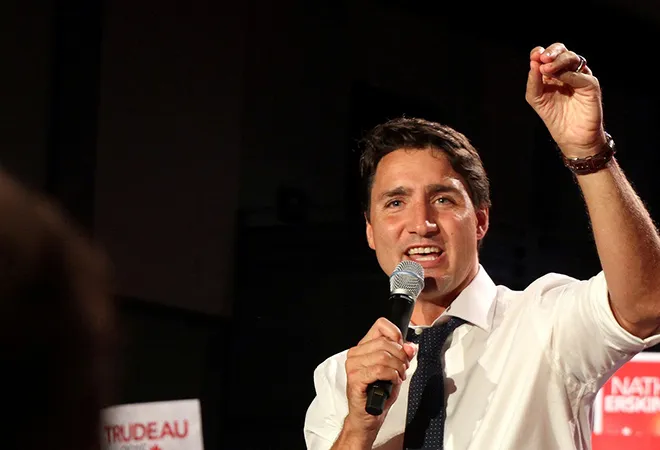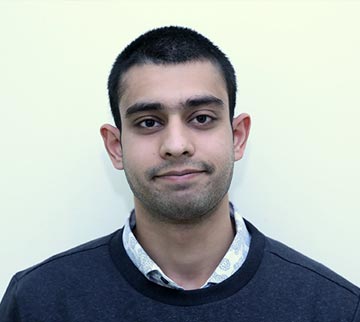-
CENTRES
Progammes & Centres
Location
Trudeau and his Liberal Party raised hopes by pursuing progressive social, economic policies such as legalising the consumption of marijuana for recreational usage in 2018 and ratifying the revised Trans-Pacific Partnership agreement — referred now as the CPTTP.

Image Source: Alex Guibord — © Flickr/CC BY-ND 2.0
Despite hiccups, the incumbent Prime Minister of Canada, Justin Trudeau, managed to secure a second term in federal elections. Trudeau’s Liberal Party won in 157 out of Canada’s 338 electoral districts (see table). It outclassed its principal opponent, the Conservative Party led by Andrew Scheer, in urban Toronto and eastern provinces of Ontario and Quebec — areas that are politically significant. In a tweet celebrating the confidence voters had entrusted in his leadership, Trudeau commented: “Thank you, Canada, for putting your trust in our team and for having faith in us to move this country in the right direction. Regardless of how you cast your vote, our team will work hard for all Canadians.”
 Source: National Post
Source: National Post
However, there is a major reason for the Liberal Party to worry. Unlike its 2015 electoral victory, when the Liberal Party formed a majority government by winning 184 seats, the 2019 election results give Trudeau a weaker mandate. Although the Conservative Party lost the election, it still secured over 34% of the popular vote. Another worrying aspect for Trudeau is that the Liberal Party was unable to win a single seat in the states of Alberta and Saskatchewan.
Against the emerging wave of populism in Canada’s immediate neighbourhood (read United States) and elsewhere, Trudeau and his Liberal Party raised hopes by pursuing progressive social, economic policies such as legalising the consumption of marijuana for recreational usage in 2018 and ratifying the revised Trans-Pacific Partnership agreement, referred now as the CPTTP. However, it seems that more effort would be required to satisfy the electorate.
While delivering economic growth and creating more jobs alongside his commitment to tackling the prevailing income disparities seems a daunting task for Trudeau, there is growing pressure to do more for environmental protection. Fulfilling these aspirations is more complicated since Trudeau would now have to rely on the Jagmeet Singh-led New Democratic Party (NDP) which has secured 24 electoral seats, including 11 in the prosperous province of British Columbia, and has consequently assumed a vital role in the formation of the next government.
Owing to NDP’s left-leaning credentials, Jagmeet is a visible partner to the Liberal Party. However, courting the NDP’s demands won’t be easy. The NDP has advocated public funding for a comprehensive healthcare programme, and an environmental action plan apart from supporting calls to tax the ‘super-rich.’ All of this implies that finding a compromise would be challenging for Trudeau, who intends to spur investments and capital inflow to Canada. Despite his advocacy for a stronger action against climate change and his party leaders equating the phenomenon with a ‘national emergency,’ Trudeau’s role in approving the $3.4 billion trans-mountain oil pipeline from Alberta to the Pacific coast put him at odds with the view that the NDP seems to oppose the project.
More importantly, Trudeau’s push for the pipeline project and allegations of intervening in the SNC-Lavalin case, in which this major Canadian infrastructure firm faced prosecution for allegedly paying bribes to the Gaddafi regime, dented his image. The opposition has also questioned Trudeau, blaming him for Canada’s rising fiscal deficit and imposing the carbon tax. Such allegations have likely weakened the Liberal Party’s and Trudeau’s position in the elections. And, while Scheer might have lost the election, he demonstrated skepticism in Trudeau’s ability to lead a stable government as he stated: “Mr. Trudeau, when your government falls, Conservatives will be ready, and we will win.” Scheer has also been a critic of Trudeau’s immigration policy that he argues aims to benefit the Liberal Party politically.
In all of this, Trudeau seems to enjoy the confidence of minority groups, especially of the Canadian Sikh community, although Jagmeet Singh’s popularity is rising steadily within the community and does pose some challenge to the Liberal Party leadership in the long-run. The political representation of Sikhs in Canada and Ottawa’s approach in dealing with the Khalistan sympathisers has routinely featured in the coverage even if Canadian elections have failed to get adequate attention in the Indian media.
Electoral performances of various Canadian political parties
| Party | Leader | Seats |
| Liberal | Justin Trudeau | 157 |
| Conservative | Andrew Scheer | 121 |
| Bloc Quebecois | Yves-François Blanchet | 32 |
| New Democratic | Jagmeet Singh | 24 |
| Green Party | Elizabeth May | 3 |
| Other | 1 | |
| Total seats = 338 |
Source: Elections Canada
From an Indian viewpoint, Trudeau’s alleged tolerance towards the fundamentalist Sikhs worries decision-makers and strategic thinkers in New Delhi. The prospects of a Liberal-NDP alliance is set to raise concerns in New Delhi, where Jagmeet is viewed critically by many for his views on the military action in the Golden Temple and the 1984 violence against the Sikhs.
A second term provides an opportunity for Trudeau to repair his standing in India that suffered significantly after his 2018 visit and also attracted criticism in Canada. Trudeau’s foreign policy activism, especially in the economic fora, could ostensibly lead to the realisation of a broader India-Canada relationship that till now has been fixated on a few issues. For the betterment of bilateral relations, there remains a need to devise a renewed India strategy that intends to achieve more than the previous Harper government’s Global Markets Action Plan or GMAP and emphasises on developing the strategic component of the relations as well. Perhaps, it is time to realise the importance of the India-Canada bilateral relationship.
The views expressed above belong to the author(s). ORF research and analyses now available on Telegram! Click here to access our curated content — blogs, longforms and interviews.

Ketan Mehta was a Junior Fellow with ORF’s Strategic Studies programme. He is currently working on the phenomenon of ‘Rising Powers’ with an emphasis on ...
Read More +